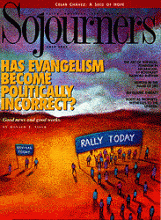Theologically it is not acceptable to choose to "hear no evil" or "see no evil" when evil manifests itself. Christians are called to confront the evil. But what if "hearing" is part of the issue? Hearing people have much to learn from, and much repentance to make to, the Deaf community.
Acting Deaf
Five years after the victories of the Deaf President Now movement at Gallaudet University (see "The Power of the Word," April 1993), deaf organizing efforts are again gaining momentum. The focus of attention now is a product not of academic institutions but of popular culture--a movie named Calendar Girl.
In this film, Jason Priestly sheds his role as social conscience in Beverly Hills 90210 to play a hard-living boxer and mob hitman who in 1962 hauls two buddies on a cross-country trek to find Marilyn Monroe. The plot and setting don't grab you, you say? Fine...but there may be even another reason not to see this flick.
The National Association for the Deaf (NAD) has raised objections to the casting of a hearing person in the role of a deaf character in this film. Is this because no deaf actors exist? Can't be; I know some. The producers simply were not sensitive to, or do not care about, a responsibility to minority communities.
NAD has "high" expectations: They believe that the film industry could use its influence to inform audiences about the realities of deafness and the abilities of deaf actors and actresses. As NAD stated recently in its publication, The Broadcaster, "The powerful medium of education through feature film is sending the 'wrong' message to the general public....We must stand ready to correct those wrongful messages and its ripple effect on accessibility and equal employment opportunity for all deaf Americans."
Read the Full Article

